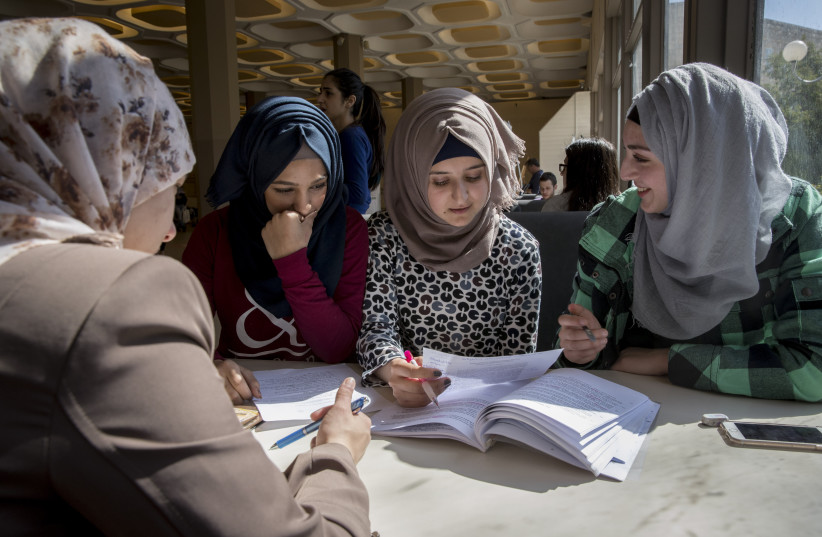Prime Minister Benjamin Netanyahu supports the freezing of funds to the education of Arabs in east Jerusalem, Finance Minister Bezalel Smotrich said on Tuesday morning.
Smotrich said that he met with the prime minister yesterday. “I coordinated this with the prime minister... he supports this decision,” he said, adding that if the funding isn’t frozen “we will have a Birzeit inside Hebrew University.” Birzeit University is a Palestinian university in the West Bank.
KAN News reported on Monday that Smotrich was withholding NIS 2.5 billion designated for east Jerusalem development through the five-year Homesh program, because it included NIS 200 million NIS in funding for Arab students.
The move drew backlash from members of both the government and the opposition, particularly as a letter was reported to have been sent to Smotrich by National Security Adviser Tzachi Hanegbi to release the funds, citing a national security recommendation. Hanegbi’s appeal states that an increase in education in east Jerusalem has led to a reduction in terrorism. Smotrich pushed back, saying that the integration of east Jerusalemites has resulted in more terrorism.
Intelligence Minister Gila Gamliel also criticized the move, saying yesterday that “The integration of the Arab population in the academy has social, economic, and security importance.”
On Tuesday night KAN reported that sources close to Netanyahu contradicted Smotrich and said that Netanyahu agreed with Hanegbi and would meet with Smotrich to tell him to release the funds.

The finance minister was clear the money would not go through, saying “the money will not pass, period.”
Where will the money go instead?
Asked if he would direct the frozen funds to Judea and Samaria, as many thought he would, Smotrich said no, adding that he will rather “find ways to transfer these budgets in such a way that they will really reach the Arab citizens of Israel.” The government has already said it is setting up a committee to discuss alternative uses of the funds, including allocating the money to boost employment in east Jerusalem.
Arab leaders have decried the decision, with mayors across the sector expressing fears of being unable to provide for the basic needs of their citizens, primarily in education.
Rahat Mayor Ata Abu Medigm said that the frozen funds are “all about improving the surface of the city, the waste, the landfill, the removal of clippings, and gardening. All the things you see every day.” He said his city was facing a deficit of NIS 8.5m.
Criticizing Smotrich, he said “Arabs are not citizens” to the finance minister, and referring to the 1948 War of Independence, he added that “If someone did not complete the work in 1948, then today he wants to come and complete the work and mow us down.”
Smotrich has previously said the coalition is under no obligation to distribute the funds since it was part of an agreement during the previous governing coalition. He reiterated this in a statement to The Jerusalem Post on Sunday, saying “This is a coalition demand of Mansour Abbas and the giving of Ayelet Shaked to Mansour Abbas. These funds are frozen until there is an inspection and oversight mechanisms in place.”
Opposition leader Yair Lapid (Yesh Atid) responded on Twitter Tuesday morning, writing that “Contrary to his lies, the budgets that Smotrich froze for the Arab local authorities are not related to ‘the coalition commitment of the previous government to the Palestinian Authority.’ These are balancing budgets for the weaker authorities in Israel and stimulus budgets for employment and education that have existed for many years.”
Labor head Merav Michaeli accused Smotrich of trying to “instigate a war between Jews and Arabs.”
Minister Amichai Chikli, who runs the Diaspora Affairs and Combatting Antisemitism Ministry and Social Equality Ministry, sent a letter against the move to Smotrich as well, saying that “there is no justification and no logic in denying balance grants.”
Pushback has also come from Interior Minister Moshe Arbel (Shas), who warned that the withholding of funds could cause a deficit crisis.
Jerusalem Mayor Moshe Lion said on Monday, in response to the cut of funding in east Jerusalem of which he is responsible, that “the program to continue supporting educational institutions in east Jerusalem will continue and even be expanded. In recent years, the program has led to very significant achievements in education in the east of the city. Such programs lead to the expansion of education and a distancing from thoughts of terrorism.”
